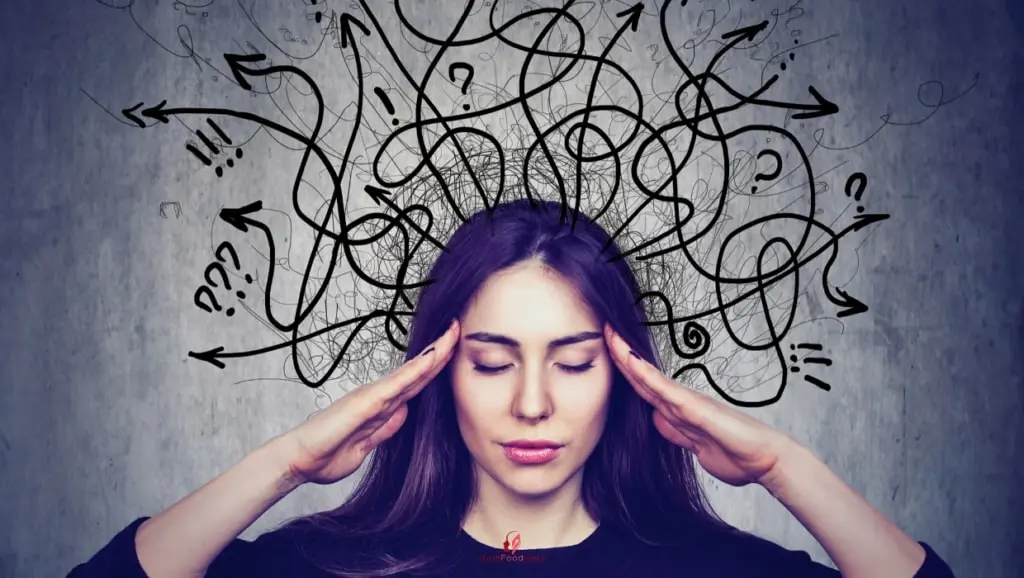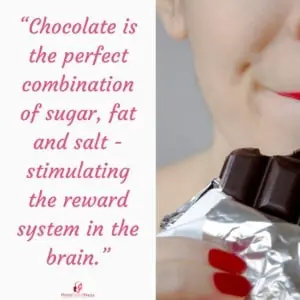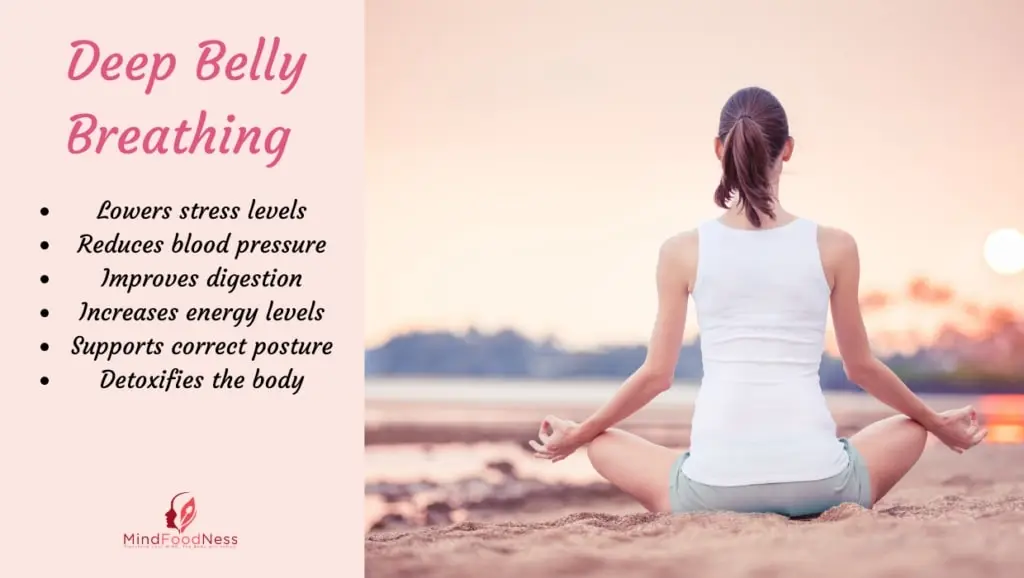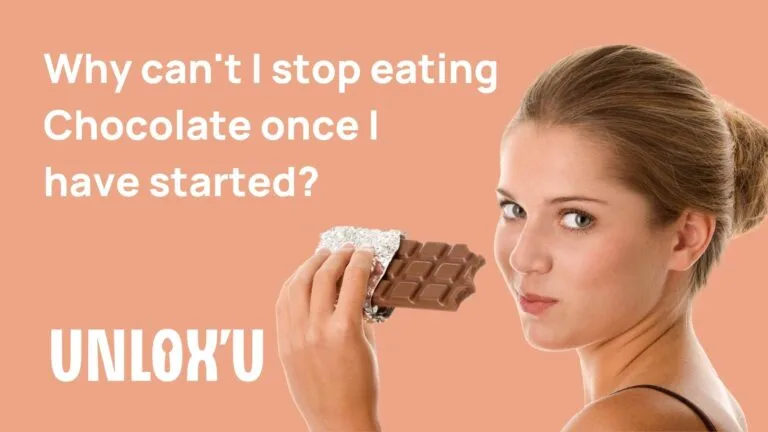
THE PSYCHOLOGY OF THE BINGE
I was tired. I was stressed. Stressed from the busy juggle of work and life in general. I had a rough day with a tense deadline to complete. Obviously, I had to eat the entire packet of __________ (insert favorite ‘go-to’ stress junk food here). Tim Tams, chips, sweets, lollies, a jar of Nutella, or whatever snack you can find with the highest amount of sugar, fat or salt. Sound a tad familiar? I think most of us would relate on some level. The psychology behind why this happens is paramount to understand if we want to beat the binge for good.

WHY WE BINGE EAT
Absolutly, there are copious reasons why we binge eat. However, the common culprits are restrictive dieting and stress. In particular, food becomes a distracting comfort blanket or ‘drug’ to cover uncomfortable emotional states. Many times, before we even feel the emotion of stress or overwhelm (or are conscious of what is going on at all), we have already devoured a packet of chips! What even happened? Moreover, diets (with their inherent restrictive nature) cause us to crave and binge more; turning eating into a vicious cycle.
DE-STRESS
Have you ever eaten chocolate to de-stress? Chocolate is the perfect food that stimulates the reward system in the brain. Namely, chocolate calms us down for a short period by releasing feel-good hormones like endorphins, dopamine and serotonin. So there is no wonder why we develop the habit of eating chocolate when life becomes all too hard…

THE PSYCHOLOGY BEHIND IT ALL
The psychology around why we crave certain foods whilst under stress is very interesting. Obviously, there is the science behind the feel-good hormones it releases. But why is it that a mouthful of sugary goodness is so comforting and even normalised in our culture? Well, we possibly learn from childhood conditioning that food is comforting. For example, we learn to associate feeling better and ‘cared for’ with treats. ‘Here little Jane, have some chocolate, you have been such a good girl getting at the doctor’. Thus, this association, alongside an emotional attachment to comforting memories, generates a sense of love and connection that we crave at a deeper level (rather than the actual food). Does this resonate?
RULES = REBEL
Further, not only can stress cause binge eating, but so can self-imposed food restrictions (i.e fad diets). The ‘naughtier’ a certain food is, the more we crave it! For instance, it’s like telling a child they can not play with the red ball, only the trucks and dolls. What toy do you think they will immediately want to play with? The ball of course. And psychologically, adults are the same.
Don’t Eat The Cake: The Psychology Of Scarcity
Ultimatly, if we make cake the forbidden food, we will focus so much on it that we will want it so badly! Thus, diets actually cause binge eating through its restrictions. It’s what we call anticipated scarcity – a marketing tactic used frequently by advertisers. If something is only available for a limited time, we want it NOW! And when we do get our hands on the cake, we become so worried about never eating it again (our brain anticipates scarcity) and we decide to devour the whole thing. Researchers Worchel, Lee, and Adewole asked participants to rate jars of cookies. One jar had 10 cookies and the other just 2. Which one did the particants choose from more often? The one with the 2 cookies of course…

HOW TO STOP BINGE EATING?
The first step is learning to separate food from our emotions. Easier said than done, right? We can do this by incorporating mindfulness around eating, whilst cultivating self-awareness around uncomfortable emotions. So before we unconsciously devour an entire packet of biscuits we learn to feel into the emotion we feel before we grab the packet. Take a few deep breaths and feel what might be going on. What unmet need do I have? What unexpressed emotion am I holding onto? There are 3 powerful tools to help with this.
1. Deep Belly Breathing (Diaphragmatic Breathing)
Firstly, breath control helps quell the stress responses in the body. It stimulates the parasympathetic nervous system which releases hormones that calm us down. When we are stressed we tend to automatically breathe quite shallow, which releases more cortisol (stress hormone) and adrenaline causing us to feel more stressed. To breathe deeply, you feel air coming through your nose, filling your lungs and the lower belly rises. At first this type of breathing might feel unnatural, however it’s all about practice and normalizing this type of breathing.
Firstly, breath control helps quell the stress responses in the body. It stimulates the parasympathetic nervous system which releases hormones that calm us down. When we are stressed we tend to automatically breathe quite shallow, which releases more cortisol (stress hormone) and adrenaline causing us to feel more stressed. To breathe deeply, you feel air coming through your nose, filling your lungs and the lower belly rises. At first this type of breathing might feel unnatural, however it’s all about practice and normalizing this type of breathing.

Gratitude
Secondly, gratitude is a technology we can harness. The human brain can not feel stressed and grateful at the same time. Lack, anger and loss can not exist in the same space as gratitude. So when you feel stress creeping in, stop, and mentally focus on something you are grateful for. I guarantee this will change your current state and emotional response. I personally practice gratitude daily. A gratitude journal can be very useful also.

3. Move!
Thirdly, another way to shift emotional states and our mindset quickly is to move. Essentially, a change in our physiology can be subtle yet very powerful. For example, if you are feeling down in the dumps, try straightening your spine, shoulders back, pull your chest up and breathe more deeply. Or go for a run or a walk. Get moving. Pump some music and dance. When we change our body, our state immediately changes. Give it a go. Ultimatly, physical movement shifts emotion. Our physiology is key to changing our emotional state and coming unstuck.

PSYCHOLOGY OF BINGE EATING
Finally, understanding the psychology behind why we binge eat is an empowering step in stopping. Techniques of deep belly breathing, gratitude and changing our physiology are three powerful ways to shift stress and feel into our emotional needs; to ultimately end binge eating and overeating. In addition, I have created a FREE Binge Eating Guide – 6 Steps to End The Binge Eating Cycle. You can download below now, completly free.
6 KEY STEPS TO
END BINGE EATING CYCLE &
RELEASE EMOTIONAL WEIGHT
Regain power over food!
Binge eating and emotional eating is not a food problem, it is an emotional problem.
We can’t rely on will-power to stop binge eating. In this e-book I am addressing the underlying reasons why we use food as a drug and what our body is trying to tell us.



